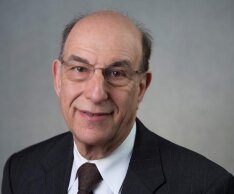Speakers

Isabel Wilkerson
Pulitzer Prize-winner Isabel Wilkerson is author of the best-selling book Caste: The Origins of Our Discontents.

David Williams
David Williams is an internationally recognized social scientist whose TED Talk, “How Racism Makes Us Sick” has been viewed over 1 million times.

Daniel Dawes
Daniel Dawes is a leader in the movement to advance health equity and a key figure in shaping the Mental Health Parity Act and the Affordable Care Act.

Richard Rothstein
Richard Rothstein is the author of The Color of Law: A Forgotten History of How Our Government Segregated America

Reed Tuckson
Co-founder, Black Coalition Against COVID, Managing Director of Tuckson Health Connections

Mildred Solomon
President, The Hastings Center
About
Righting the Wrongs: Tackling Health Inequities
The Health Equity Summit
6 CME credits provided
FULL AGENDA
January 19 10am – 1pm ET (virtual)
Welcome:
Reed Tuckson, Co-founder, Black Coalition Against COVID and Managing Director of Tuckson Health Connections
Mildred Solomon, President, The Hastings Center
Keynote Speakers:
Isabel Wilkerson, Pulitzer Prize-winning author of Caste: The Origins of
Our Discontents and The Warmth of Other Suns
Richard Rothstein, Economic Policy Institute, author The Color of Law on state-sponsored segregation
David Williams, professor of public health and presenter of the TEDMED talk “How Racism Makes Us Sick”
The first day will focus on historical events and decisions that have led to major inequities in health today. It is designed for the general public, and health professionals, researchers, and policymakers.
January 20 10am – 2:30pm ET (virtual)
Keynote Speaker:
Daniel Dawes, Satcher Health Leadership Institute, Morehouse College of Medicine, and a key figure in shaping the Mental Health Parity Act and the Affordable Care Act. Author, The Political Determinants of Health
The second day will offer insights and examples of promising strategies that policymakers, researchers, health care leaders, and caregivers can employ to address inequities through policy, clinical care, medical education, research, and community collaborations.
Full agenda. Continuing education credit to be provided (6.25 credits). Registration is free.
The event is sponsored by The Hastings Center and the Association of American Medical Colleges’ Center for Health Justice in collaboration with the American Medical Association, the American Nursing Association, the American Hospital Association, and the ABIM Foundation. It is made possible by the generous support of Hastings Center Advisory Council members Frank Trainer and Andrew S. Adelson.
Sponsors
The Hastings Center is a global leader in ethics research, and as an independent organization, it pursues society’s most controversial ethical issues at the intersection of health, science, and technology. Hastings research scholars explore pressing, timely issues related to two broad themes: just and compassionate care for people of all ages and wise use of emerging technologies. We are experts at advancing collaborative scholarship that blends ethical analysis with public impact. Hastings offers a trusted nonpartisan platform for stakeholders with diverse perspectives. We leverage these strengths to build forward-focused connections across deep divides, a true rarity in these politically contentious times. Learn more at: thehastingscenter.org

The AAMC (Association of American Medical Colleges) is a nonprofit association dedicated to transforming health through medical education, health care, medical research, and community collaborations. The AAMC Center For Health Justice sparks community-centered, multisector research, collaboration, and action to make the case for policies and practices that ensure all communities have an equal opportunity to thrive. Its members are all 155 accredited U.S. and 17 accredited Canadian medical schools; approximately 400 teaching hospitals and health systems, including Department of Veterans Affairs medical centers; and more than 70 academic societies. Additional information about the AAMC is available at aamc.org.
The American Nurses Association (ANA) is the premier organization representing the interests of the nation’s 4.3 million registered nurses. ANA advances the profession by fostering high standards of nursing practice, promoting a safe and ethical work environment, bolstering the health and wellness of nurses, and advocating on health care issues that affect nurses and the public. ANA is at the forefront of improving the quality of health care for all. For more information, visit nursingworld.org.
The American Medical Association is the physicians’ powerful ally in patient care. As the only medical association that convenes 190+ state and specialty medical societies and other critical stakeholders, the AMA represents physicians with a unified voice to all key players in health care. The AMA leverages its strength by removing the obstacles that interfere with patient care, leading the charge to prevent chronic disease and confront public health crises, and driving the future of medicine to tackle the biggest challenges in health care. For more information, visit ama-assn.org.

The American Hospital Association (AHA) is a not-for-profit association of health care provider organizations and individuals that are committed to the health improvement of their communities. The AHA advocates on behalf of our nearly 5,000 member hospitals, health systems and other health care organizations, our clinician partners – including more than 270,000 affiliated physicians, 2 million nurses and other caregivers – and the 43,000 health care leaders who belong to our professional membership groups. Founded in 1898, the AHA provides insight and education for health care leaders and is a source of information on health care issues and trends. For more information, visit the AHA website at www.aha.org.
![]()
The ABIM Foundation’s mission is to advance medical professionalism to improve the health care system by collaborating with physicians and physician leaders, medical trainees, health care delivery systems, payers, policymakers, consumer organizations and patients to foster a shared understanding of professionalism and how they can adopt the tenets of professionalism in practice. To learn more about the ABIM Foundation, visit www.abimfoundation.org, connect on Facebook or follow on Twitter.
Program Committee
Philip M. Alberti, PhD
Association of American Medical Colleges
Rumay Alexander, EdD, RN
American Nurses Association Scholar in Residence
Emily Cleveland-Manchanda, MD, MPH
American Medical Association
Malika Fair, MD, MPH
Association of American Medical Colleges
Michele Goodwin, JD
University of California, Irvine
Susan Dorr Goold, MD
University of Michigan
Karthik Sivashanker, MD, MPH
American Medical Association
Mildred Solomon, EdD
The Hastings Center
Contact
For more information, please contact:
- Mark Cardwell or Susan Gilbert
The Hastings Center
845-424-4040 x244
[email protected] - John Buarotti
Association of American Medical Colleges
202-828-0632
[email protected] - Cristina Mutchler
American Medical Association
(312) 464-4430
[email protected] - Shannon McClendon
301-628-5391
American Nurses Association
shannon.mcclendon@ana.org - Sean Barry
American Hospital Association
202-626-2306
[email protected] - Jaime McClennen
ABIM Foundation
215-446-3576
[email protected]



